Getting Started
Venturing into entrepreneurship can feel daunting, but few investments of time and money are as rewarding as building a business from the ground up. Mushroom farming offers exciting opportunities, with high demand, sustainable methods, and excellent growth potential (outlined in our article What’s Special About the Mushroom Market). At MycoLogic, we’ve developed actionable steps based on industry experience and insights from our partner farmers to guide you on your journey to becoming a successful commercial mushroom grower.
Gowin Valley Farms, pictured in Figure 1 below, is one of our proudest success stories. Starting with no prior knowledge of mushroom cultivation, they now produce over 15,000 pounds of mushrooms annually. With just two employees, they’ve expanded to grow multiple varieties and generate $200,000 in annual revenue.
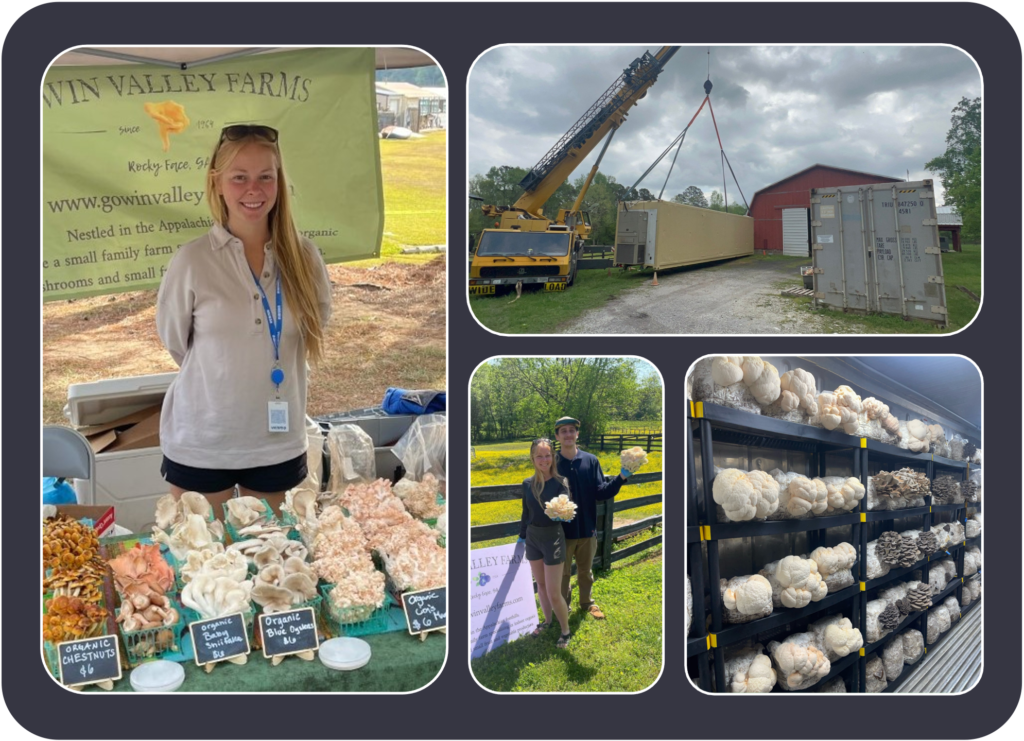
With the right guidance and a strategic approach, you too, can create a thriving mushroom business. The following actionable steps will help you build a solid foundation, gain essential skills, and tap into a profitable market.
Learn How Mushrooms Grow
Before launching a commercial operation, it’s essential to learn the basics of mushroom cultivation. Start by familiarizing yourself with the mushroom life cycle, which includes three main stages: colonization, primordia formation, and mushroom production. We have outlined each of these stages in our article The Mushroom Life Cycle Explained. As you build your knowledge, you can dive deeper into concepts like substrate preparation and inoculation, which are crucial for improving long-term margins. However, for beginners, we recommend starting with simpler methods, like using ready-to-fruit substrate blocks, where you can easily focus on the primordia formation and, ultimately, the mushroom production. Utilizing ready-to-fruit blocks and placing them in controlled environment systems makes it significantly easier to begin fruiting mushrooms early on.
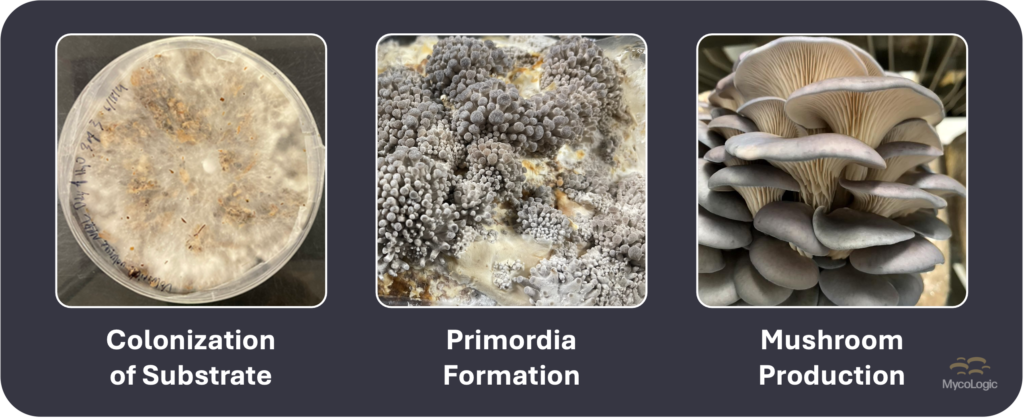
Select a Strain
Choosing the right strain for your mushroom cultivation depends largely on the demand in your local market, but it’s also important to consider the learning curve associated with each strain. While there are several options available, here are some recommendations based on your level of experience:
- Oyster (Beginner): Oyster mushrooms have a fast fruiting cycle, allowing you to see quick results. Their rapid growth outpaces potential contaminants, reducing the risk of losing a harvest, making them an ideal choice for beginners looking to build confidence and experience.
- Maitake (Intermediate): Maitake mushrooms require more precise growing conditions, which can make consistent, large flushes more challenging. However, their rich flavor and renowned health benefits drive strong market demand, allowing you to command a higher price.
- Cordyceps (Advanced): Cordyceps are prized for their adaptogenic and immune-boosting properties, making them highly sought after in the health market. However, they grow on insects, rather than plant material, and senesce quickly, making their cultivation more complex. Despite this, their premium market price can make them a lucrative option for experienced growers.
Grow on a Small Scale
Starting small allows you to master each step of mushroom cultivation and become confident in handling each growth stage. A smaller-scale setup makes it easier to troubleshoot issues like contamination or environmental inconsistencies, giving you a chance to refine your methods. Moreover, it helps you test and establish reliable sales channels, building customer relationships that can support larger, consistent harvests when you’re ready to expand.
To successfully fruit mushrooms, you need to maintain precise levels of humidity, temperature, and fresh air exchange—conditions that directly impact growth and quality. Using a grow tent to control these factors more accurately, minimizing the risks of environmental fluctuations and contamination and ensuring optimal yields. We recommend North Spore’s BoomRoom as a simple setup that will allow you to gain experience with the cultivation process while producing enough for you to begin opening up your sales channels. If you go with this option, use coupon code MYCOLOGIC10 to get 10% off at checkout.
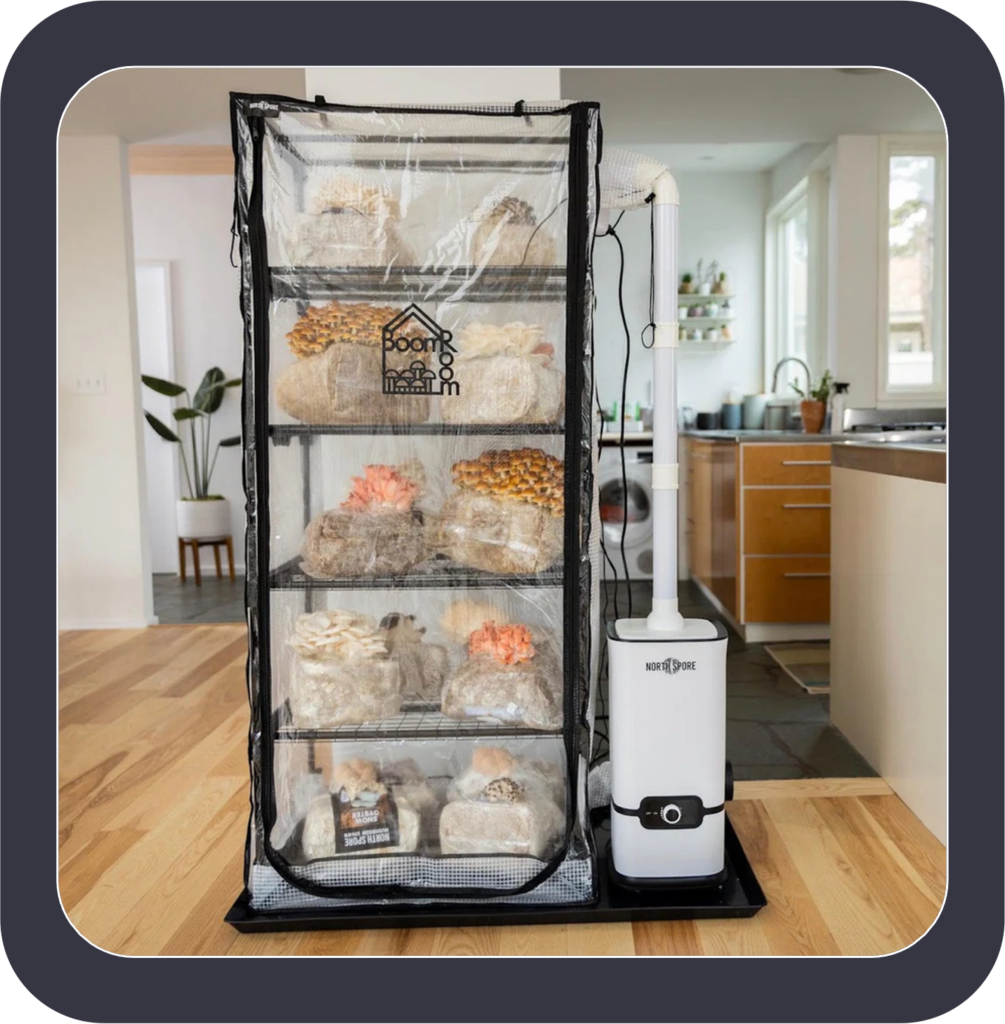
Compare Ready-to-Fruit Substrate vs. Self-Inoculating Options
Ready-to-fruit substrates offer beginners a convenient way to start. These substrates come fully colonized with mushroom spawn, so they’re ready to enter the fruiting stage immediately. This eliminates the need for the initial stages of inoculation and colonization, allowing you to focus on learning to create the right fruiting conditions.
Both North Spore and Cap N’ Stem have ready-to-fruit blocks to get you started and bulk order capabilities when you’re ready to ramp up. We recommend pricing out a few suppliers based on your location, as shipping costs are a major factor when it comes to obtaining ready-to-fruit blocks.
For experienced growers, self-inoculating substrates offer more control and can reduce costs long-term. We see ready-to-fruit blocks costing around $10-$15 per 10lb block in bulk orders ($30 per one-off block), while producing your own substrates and self-inoculating can bring the cost below $3 per 10lb block. This process does, however, require a higher level of expertise, equipment, and sterile handling to prevent contamination.
In short, ready-to-fruit substrates are ideal for beginners or those with limited time, while self-inoculation suits growers who want to manage every step and explore cost-saving options.
Package Your Mushrooms
Once you’ve harvested your first yield, packaging plays a crucial role in preserving and showcasing the freshness and quality of your mushrooms. The two main packaging options are plastic and cardboard, with each offering distinct advantages.
Plastic is much more resistant to damage and can look professional. However, plastic can trap moisture, creating an environment that may encourage microbial growth and spoilage if not carefully managed.
Cardboard allows excess moisture to evaporate helping to mitigate the risk of spoilage. It’s also a better option if you prioritize sustainability and natural aesthetics. If you’re seeking a reliable supplier, we recommend Sun Sugar Farms, which offers durable, compostable containers. Use coupon code MYCOLOGIC10 at checkout to get 10% off.
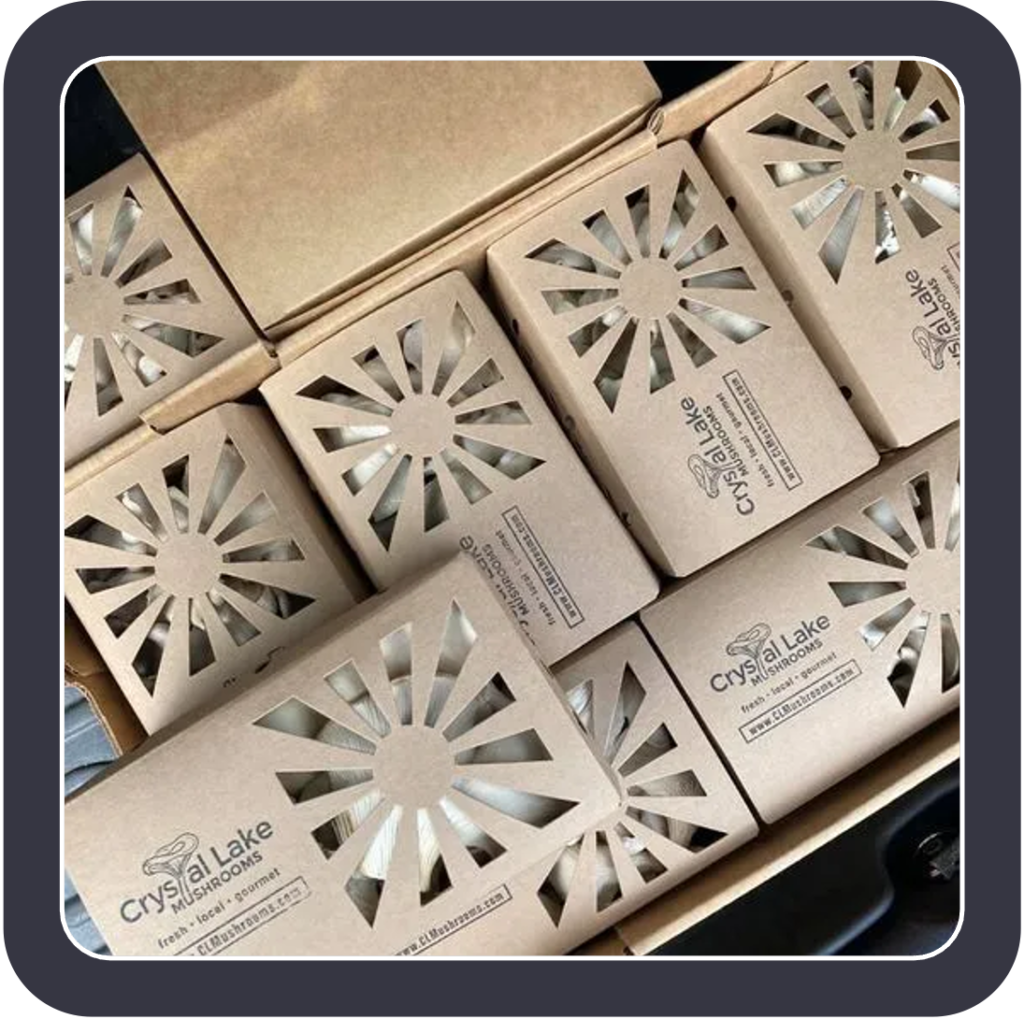
Explore Sales Channels
A successful mushroom business relies on finding the right customers. Before scaling up, research your local market to identify suitable sales channels. If you’re producing under 1,000 pounds a month, try these channels:
- Restaurants: Chefs highly value fresh, local mushrooms and often place consistent orders.
- Farmers Markets: These markets provide great visibility and allow you to educate customers on gourmet mushrooms.
- Local CSAs (Community Supported Agriculture): Many CSAs welcome unique products like mushrooms in their subscriber boxes.
- Online Sales: Consumers increasingly seek specialty mushrooms online, so consider offering delivery.
These channels typically command higher prices, with specialty mushrooms often selling for $16–$24 per pound. We’ve found that offering free samples, especially to restaurants, can make a big difference in opening the door for sales discussions.
As your production grows, you may explore wholesale channels, such as:
- Food Distributors: Distributors serving restaurants, hotels, and other food services seek bulk orders of local produce.
- Grocery Stores and Supermarkets: Approach both national and local grocers for high-volume, consistent sales.
- Institutional Sales: Hospitals, universities, and schools increasingly seek fresh, local, and healthy food options.
While wholesale prices are much lower, ranging from $3–$5 per pound, they provide steady, high-volume sales that are ideal for scaling.
Start Your Business & Get Support
Starting a business is easier with mentorship and guidance. Utilize local Small Business Development Centers or community incubators like our friends at HatchBridge, which offers valuable programs for early-stage business development. These programs often provide mentorship and strategies for identifying customer segments and creating effective outreach plans. Many of these resources are free or low-cost and can help you build a solid foundation.
As you grow, financial support may be necessary for equipment investments. USDA loans and grants are a great resource for agricultural entrepreneurs. If you’re looking for help exploring funding options, our partners at Good Agriculture can help identify the opportunities best suited to your needs and assist with application writing to enhance your chances of success. If this is something you end up pursuing, be sure to mention MycoLogic to get a discount on their services.
Explore Options for Expansion
Once you’ve established a reliable customer base and have a solid understanding of cultivation, consider scaling up with MycoLogic’s controlled environment systems.
At MycoLogic, we offer turnkey, semi-autonomous Fruiting Modules designed for precision. Our modules maintain ideal temperature, humidity, and CO2 levels automatically, ensuring consistent yields with reduced labor input. Our Spore 40 Fruiting Module is designed specifically for mushroom cultivation, offering a streamlined, data-driven approach to growth. With our technology, mushroom farmers can efficiently meet demand, improve productivity, and increase profitability.
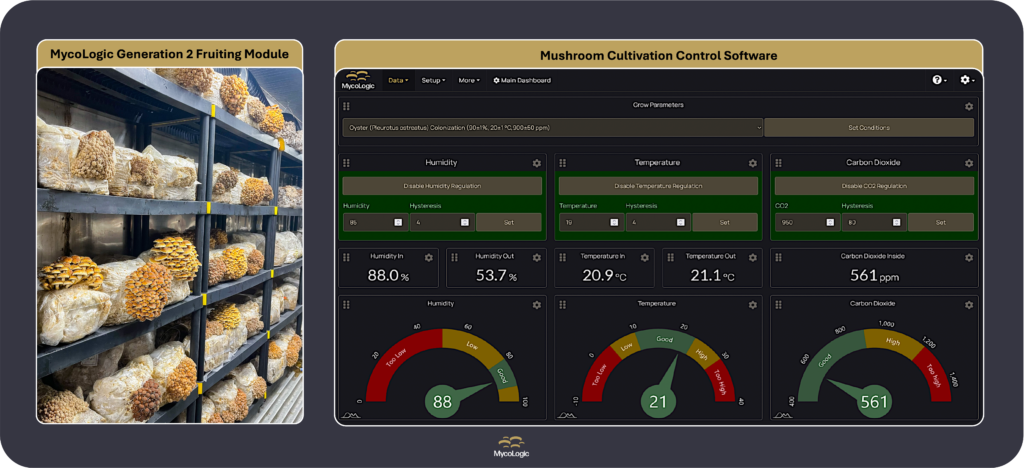
Conclusion
The specialty mushroom market continues to grow as consumers seek health-conscious and sustainable options. By following these steps, you can find your place in this evolving industry and turn mushroom cultivation into a successful business. Whether you start small or scale quickly with the latest technology, mushroom farming offers a rewarding and profitable path forward.

If you’re curious about how MycoLogic can support your farming journey, reach out to us today!